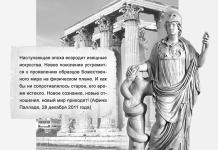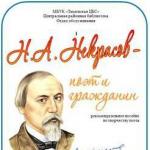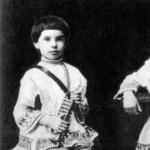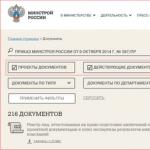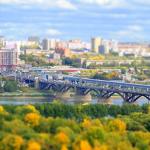The work of N. A. Nekrasov is a bright and interesting page of Russian classical literature. Continuing and enriching the ideas and paths outlined by Pushkin and Lermontov, Nekrasov stepped far forward in the development of those democratic ideals, patriotic views and tendencies that were stated in the works of his great predecessors. Nikolai Alekseevich’s muse is “the muse of anger and sadness,” the sister of the peasant woman who was beaten with a whip on the Sennaya. All his life he wrote about the people and for the people, and “homegrown” Russia - poor, destitute and beautiful - appears before us from the pages of his poetry collections as if alive.
History of creation
An analysis of the poem “The Poet and the Citizen,” like any other, should begin with a study of the history of its creation, the socio-political situation that was developing in the country at that time, and the biographical data of the author, if they are somehow related to the work. The date of writing the text is 1855 - June 1856. It was first published in the author’s collection, published in the same ’56. Before this, Chernyshevsky announced Nekrasov’s book by publishing in the next issue of Sovremennik a short review and analysis of the poem “The Poet and the Citizen” and its text, as well as several other bright and biting works in Nekrasov’s style, including the bitter satire “The Forgotten Village.”

The publications caused a great resonance in society and sharp dissatisfaction with the authorities and official criticism. In “The Poet and the Citizen” the autocratic government saw (quite rightly, by the way) harsh criticism of itself and subversive, revolutionary calls. The entire issue of Sovremennik, as well as the circulation of the book, were withdrawn from public access and prohibited from reprinting. The magazine itself was in danger of being closed. And Nekrasov, who was abroad at that time, faced the threat of arrest upon his return. Why was the reaction of the authorities and censorship so violent? An analysis of the poem “The Poet and the Citizen” will help you understand this.
Literary traditions and continuity
When Nekrasov heard rumors about the government’s outrages in the field of culture, public opinion, and literature, he replied that Russian writers had seen “censorship storms even worse.” And Nekrasov adopts democratic values, civic consciousness and a sense of responsibility of a creative person to society, country, time and his own talent from his older brothers in writing - Pushkin (just remember his famous “Conversation of a Bookseller with a Poet”) and Lermontov (“Journalist, Reader and Writer” "). Analysis of the poem “The Poet and the Citizen” makes it possible to trace how much Alexey Nikolaevich developed and deepened the great poetic traditions.
“Pure art” and the democratic line
50-60s The 19th century was an extremely tense time for Russia. Despite the reaction, police oppression and autocratic censorship, dissatisfaction with the political climate is spreading in the country, and the self-awareness of progressive layers of the population is growing.

Serfdom is bursting at all the seams, ideas of popular liberation, anger and revenge are in the air. At this time, intense debates are taking place among representatives of the creative intelligentsia. “The Poet and the Citizen” - Nekrasov’s verse - clearly reflects their essence. Representatives of the so-called “pure art” (on their behalf the Poet argues in the work) believe that poetry, literature, as well as music and painting, should talk about the “eternal.” That real art is above socio-political problems and As an example of such a position, Nekrasov cites a quote from Pushkin’s work (“Poet and Citizen”, verse “We were born for inspiration / For sweet sounds and prayers...”). The Citizen appears in the poem as an ardent opponent of this point of view and a defender in art. It reflects the views and ideas of the author himself, democratic tendencies and aspirations.
Theme and idea of the poem
Nekrasov never divided his poetry into purely lyrical, intimate, and civil. These two directions, seemingly completely different, harmoniously combined in his work into one common stream. “The Poet and the Citizen” (analysis of the poem proves this statement) is a programmatic work in the sense that it reveals the most important concepts for the author and touches on pressing issues.

Nekrasov clearly and openly expressed his creative and socio-political credo: it doesn’t matter who you are by profession or beliefs. It is important that you are the son of your country, and therefore a citizen who is obliged to fight for it, for a better life, prosperity, both economic and spiritual. Unfortunately, very few people agree with him. Therefore, the Citizen exclaims with bitterness: “Against the good hearts / To whom the homeland is holy.” In a “time of grief and sadness,” talented, honest, educated people do not have the right to sit on the sidelines and sing of the “beauties of nature” and “darling’s affection.” Artists, especially writers, are endowed with a special gift - to influence the minds and hearts of people, to lead them to a feat. To fulfill one's duty, to devote oneself to serving the Motherland and the people - this is what Nekrasov sees as the purpose of the creative personality. “The Poet and the Citizen,” which we are analyzing, is a poem-manifesto, a poem-call, openly calling on all fellow writers to come out on the side of the people: “There will be no worthy citizen / Cold-hearted towards the fatherland / He has no worse reproach...” .
Composition of the work and stylistic features
So, the theme of the poem is the poet and poetry, their role in the socio-political movement of the country. The main idea and the main thought are expressed in the following lines: “Be a citizen... / Live for the good of your neighbor...”. In order to express it more clearly and more clearly, more clearly to convey it to readers, Nekrasov chooses an original form for the lyrical

the works are a dramatized dialogue, an ideological dispute. The characters' remarks are interspersed with the Citizen's passionate monologues and are full of exclamations, making his speeches extremely emotional. At the same time, the Poet also writes in his own way. A large number of imperative verbs, socio-political vocabulary, and appealing intonations create in readers that very active mood that Nekrasov strives for. “The Poet and the Citizen” is a poem with which he fully succeeded in proving to the masters of words that their task is not “fine literature” and pleasing the ears of its lovers, not idle talk, but serving the people. The work in question has not lost its relevance even today.
Citizen(included)
Alone again, harsh again
He lies there and writes nothing.
Poet
Add: moping and barely breathing -
And my portrait will be ready.
Citizen
Nice portrait! No nobility
There is no beauty in him, believe me,
It's just vulgar foolishness.
A wild animal knows how to lie down...
Poet
So what?
Citizen
It's a shame to watch.
Poet
Well, then go away.
Citizen
Listen: shame on you!
It's time to get up! You know yourself
What time has come;
In whom the sense of duty has not cooled,
Who is incorruptibly straight in heart,
Who has talent, strength, accuracy,
Tom shouldn't sleep now...
Poet
Let's say I'm such a rarity
But first we need to give a job.
Citizen
Here's the news! You're dealing
You only fell asleep temporarily
Wake up: boldly smash the vices...
Poet
A! I know: “Look, where did you throw it!”
But I'm a shelled bird.
It's a pity, I don't want to talk.
(Takes a book)
Savior Pushkin! - Here is the page:
Read it - and stop reproaching!
Citizen(is reading)
“Not for everyday worries,
Not for gain, not for battles,
We were born to inspire
For sweet sounds and prayers."
Poet(with delight)
Inimitable sounds!..
Whenever with my Muse
I was a little smarter
I swear, I wouldn’t pick up a pen!
Citizen
Yes, the sounds are wonderful... hurray!
Their strength is so amazing
That even the sleepy blues
It slipped from the poet's soul.
I’m sincerely happy - it’s time!
And I share your delight,
But I confess, your poems
I take it more to heart.
Poet
Don't talk nonsense!
You are a zealous reader, but a wild critic.
So, in your opinion, I am great,
A poet taller than Pushkin?
Say please?!.
Citizen
Oh no!
Your poems are stupid
Your elegies are not new,
Satyrs are alien to beauty,
Ignoble and offensive
Your verse is viscous. You are noticeable
But without the sun the stars are visible.
In the night that is now
We live fearfully
When the beast roams freely,
And the man wanders timidly, -
You held your torch firmly,
But the sky was not pleased
So that it burns under the storm,
Lighting the way publicly;
A trembling spark in the darkness
It burned slightly, blinked, and rushed about.
Pray that he waits for the sun
And drowned in its rays!
No, you are not Pushkin. But for now
The sun is not visible from anywhere,
It’s a shame to sleep with your talent;
It’s even more shameful in a time of grief
The beauty of the valleys, skies and sea
And sing of sweet affection...
The thunderstorm is silent, with a bottomless wave
The skies argue in the radiance,
And the wind is gentle and sleepy
The sails barely flutter, -
The ship runs beautifully, harmoniously,
And the travelers’ hearts are calm,
As if instead of a ship
Beneath them is solid ground.
But the thunder struck; the storm is moaning,
And it tears the rigging, and tilts the mast, -
This is not the time to play chess,
This is not the time to sing songs!
Here is a dog - and he knows the danger
And barks furiously into the wind:
He has nothing else to do...
What would you do, poet?
Is it really in a distant cabin?
You would become an inspired lyre
To please the ears of sloths
And drown out the roar of the storm?
May you be faithful to your destination,
But is it easier for your homeland,
Where everyone is devoted to worship
Your single personality?
Against good hearts,
To whom the homeland is sacred.
God help them!.. and the rest?
Their goal is shallow, their life is empty.
Some are money-grubbers and thieves,
Others are sweet singers,
And still others... still others are sages:
Their purpose is conversation.
Protecting your person,
They remain idle, repeating:
“Our tribe is incorrigible,
We don't want to die for nothing,
We are waiting: maybe time will help,
And we are proud that we do no harm!”
Cunningly hides an arrogant mind
Selfish dreams
But... my brother! whoever you are
Don't believe this despicable logic!
Be afraid of sharing their fate,
Rich in word, poor in deed,
And do not go to the camp of the harmless,
When you can be useful!
The son cannot look calmly
On my dear mother's grief,
There will be no worthy citizen
I have a cold heart for my homeland,
There is no worse reproach for him...
Go into the fire for the honor of your fatherland,
For conviction, for love...
Go and perish impeccably.
You will not die in vain: the matter is strong,
When blood flows underneath...
And you, poet! chosen one of heaven,
Herald of age-old truths,
Do not believe that he who has no bread
Not worth your prophetic strings!
Don’t believe that people will fall altogether;
God has not died in the souls of people,
And a cry from a believing chest
Will always be available to her!
Be a citizen! serving art,
Live for the good of your neighbor,
Subordinating your genius to feeling
All-embracing Love;
And if you are rich in gifts,
Don’t bother exhibiting them:
They themselves will shine in your work
Their life-giving rays.
Look: solid stone in fragments
The poor worker crushes
And from under the hammer it flies
And the flame splashes out on its own!
Poet
Have you finished?.. I almost fell asleep.
Where do we care about such views!
You've gone too far.
It takes a genius to teach others,
It takes a strong soul
And we with our lazy soul,
Proud and timid,
We're not worth a penny.
In a hurry to achieve fame,
We are afraid to go astray
And we walk along the path,
And if we turn to the side -
Lost, even if you run away from the world!
How pathetic are you, the role of a poet!
Blessed is the silent citizen:
He, alien to the Muses from the cradle,
Master of your actions,
Leads them to a rewarding goal,
And his work is successful, the dispute...
Citizen
Not a very flattering sentence.
But is it yours? was it said by you?
You could judge more correctly:
You may not be a poet
But you have to be a citizen.
What is a citizen?
A worthy son of the Fatherland.
Oh! We will be merchants, cadets,
Bourgeois, officials, nobles,
Even poets are enough for us,
But we need, we need citizens!
But where are they? Who is not a senator?
Not a writer, not a hero,
Not a leader, not a planter,
Who is a citizen of the native country?
Where are you? respond! No answer.
And even alien to the poet’s soul
His mighty ideal!
But if he is between us,
What tears he cries!!
A heavy lot fell on him,
But he doesn’t ask for a better share:
He wears it on his body like his own
All the ulcers of your homeland.
__________________
The thunderstorm makes noise and drives towards the abyss
Freedom's shaky boat,
The poet curses or at least groans,
And the citizen is silent and continues
Under your head.
When... But I’m silent. At least a little
And among us fate appeared
Worthy citizens... You know
Their fate?.. Kneel!..
Lazy person! your dreams are funny
And frivolous penalties!
Your comparison makes no sense.
Here is a word of impartial truth:
Blessed is the chattering poet,
And the silent citizen is pathetic!
Poet
It’s no wonder to achieve this,
There is no need to finish off anyone.
You're right: it's easier for a poet to live -
There is joy in free speech.
But was I involved in it?
Ah, in the years of my youth,
Sad, unselfish, difficult,
In short - very reckless -
How zealous was my Pegasus!
Not roses - I wove nettles
In his sweeping mane
And he proudly left Parnassus.
Without disgust, without fear
I went to prison and to the place of execution,
I went to courts and hospitals.
I won’t repeat what I saw there...
I swear I honestly hated it!
I swear, I truly loved!
So what?.. hearing my sounds,
They considered them black slander;
I had to fold my hands humbly
Or pay with your head...
What was to be done? Recklessly
Blame people, blame fate.
If only I could see a fight
I would fight, no matter how difficult it is,
But... perish, perish... and when?
I was twenty years old then!
Life slyly beckoned forward,
Like free streams of the sea,
And love tenderly promised
My best blessings -
The soul fearfully retreated...
But no matter how many reasons,
I don't hide the bitter truth
And I timidly bow my head
At the word “honest citizen.”
That fatal, vain flame
To this day it burns my chest,
And I'm glad if someone
He will throw a stone at me with contempt.
Poor man! and from what he trampled
Are you a sacred man's duty?
What kind of gift did you take from life?
Are you the son of a sick person of a sick century?..
If only they knew my life,
My love, my worries...
Gloomy and full of bitterness,
I'm standing at the door of the coffin...
Ah, my farewell song
That song was the first!
The Muse bowed her sad face
And, quietly sobbing, she left.
Since then there have been infrequent meetings:
Stealthily, pale, he will come
And whispers fiery speeches,
And he sings proud songs.
Calls now to the cities, now to the steppe,
Full of cherished intentions,
But suddenly the chains rattle -
And she will disappear in an instant.
I wasn’t completely alienated from her,
But how afraid I was! how afraid I was!
When my neighbor drowned
In waves of essential grief -
Now the thunder of heaven, now the fury of the sea
I chanted good-naturedly.
Scouring little thieves
For the pleasure of the big ones,
I marveled at the audacity of the boys
And he was proud of their praise.
Under the yoke of years the soul bent,
She's cooled down to everything
And the Muse turned away completely,
Full of bitter contempt.
Now I appeal to her in vain -
Alas! disappeared forever.
Like the light, I don’t know her myself
And I will never know.
O Muse, a random guest
Have you appeared to my soul?
Or songs are an extraordinary gift
Fate intended for her?
Alas! who knows? harsh rock
Everything was hidden in deep darkness.
But there was one crown of thorns
To your gloomy beauty...
Analysis of the poem “Poet and Citizen” by Nekrasov
Most of Nekrasov's works are written in the genre of civil lyrics. Moreover, in many of them he directly expressed his beliefs about the role of the poet in society, about his civic duty. These views are set out in most detail in the poem “The Poet and the Citizen” (1855).
The poem is a dialogue between the poet and the citizen, which is a reflection of the author's thoughts.
The work begins with a citizen's reproaches to the poet, who is spending his time idly. The poet justifies his inaction by the fact that he is aware of his insignificance before the genius of Pushkin and believes that he will never reach the same heights in creativity. The citizen confirms this, but says that when the sun sets (Pushkin), stars flash in the sky and hold back the darkness until the next dawn. No matter how imperfect the poet’s poems are, he is still obliged to create them, because he keeps a particle of divine fire in his soul. The poet, as the “chosen one of heaven,” must first of all take care of his country and its people.
In response to this sublime speech, the poet declares that his goal is to achieve fame. All the poet’s deeds and actions are subordinated to this goal. Fulfilling civic duty would lead to deviation from the intended path. The citizen’s objection is the central phrase of the work, which has become a catchphrase - “You may not be a poet, but you must be a citizen.” He declares that a person's social position and status mean nothing if he is indifferent to the fate of his country. He bitterly admits that there are no such people among his contemporaries. And those who see the plight are afraid to speak the words of truth.
The poet, moved by these words, tells his story. In his youth, he was not afraid of anything and freely denounced social vices in his poems. The Muse accompanied him in this matter. But instead of human gratitude, he experienced ridicule and persecution. Nobody needed his truth. Fear of public condemnation led the poet to avoid sensitive topics, glorifying insignificant actions and deeds. This provided a means of subsistence and a quiet life. But the poet lost the favor of the Muse, who left him forever. Only over the years did he come to understand that the Muse does not tolerate false jewelry. Her beauty is most emphasized by the “crown of thorns”.
The poem “Poet and Citizen” is very important for understanding Nekrasov’s central idea. Serving “pure art” is not only useless, but also harmful. The poet must be aware of his civic responsibility. Only this will help him develop and strengthen his creative talent.
The poem “Poet and Citizen” was written by N.A. Nekrasov in 1856. By this time, the collection of the poet’s poems had already passed censorship and was typed. Nekrasov could include the work at the end of the collection or at the beginning. I put it at the beginning, thereby giving it a programmatic character.
The work is constructed in the form of a dialogue between the Poet and the Citizen. Let us note here the presence of a dramatic beginning. The main theme is the role of poetry in public life. We can classify the poem as civil poetry.
The dialogue begins with a remark from the Citizen addressed to the Poet. He tries to distract his interlocutor from the blues and idleness:
Listen: shame on you!
It's time to get up! You know yourself
What time has come;
In whom the sense of duty has not cooled,
Who is incorruptibly straight in heart,
Who has talent, strength, accuracy,
Tom shouldn't sleep now...
The poet is overcome by doubts - about his talent, about the strength of his soul, about the very role of a creator in society. What does the Citizen answer to this? Its famous:
Be a citizen! serving art,
Live for the good of your neighbor,
Subordinating your genius to feeling
All-embracing Love...
He notes that it is impossible “in times of grief to sing about the beauty of the valleys, the skies and the sea And the sweet affection…”. This is the main meaning of the poem, its idea. It is addressed to all people, calling on them not to believe in “contemptible logic,” to part with their illusions and remain true to their convictions, to gain the necessary fortitude in the struggle. “A citizen worthy of his homeland will not be cold in soul...” and “You may not be a poet, But you must be a citizen” - these are the two phrases that make up the leitmotif of the work. The citizen calls on the Poet to heroism:
Go into the fire for the honor of your fatherland,
For conviction, for love...
Go and perish impeccably.
You will not die in vain: the matter is strong,
When blood flows underneath.
Nekrasov’s poet is dissatisfied with both himself and the world. He doubts his own talent:
Oh, Muse, a random guest
Have you appeared to my soul?
As the researchers accurately note, “the mental state of the poet, who is in deep blues, sick, is an initial state close to Nekrasov himself.<…>Nekrasov is both a poet and a citizen at the same time... the poem is his soul, revealed to the readers.” This work for the first time reflected the internal dialogue, the dispute with himself, which Nekrasov waged throughout his entire career. There are contradictions both in the soul of the Poet and in the soul of the Citizen. The only absolute truth in this dialogue is “Savior Pushkin.” Not only the Poet, but also Nekrasov himself appeals to him. Thus, this work presents a dispute between two voices in one person: the poet honestly speaks about his doubts, about the difficulties of the chosen path, about the desire for an ideal.
The poem is full of literary reminiscences. The dialogue between the Poet and the Citizen itself reproduces the form of “Conversation between a bookseller and a poet” by A.S. Pushkin. The motif of “burning” with civic ideals reminds us of Pushkin’s letter “To Chaadaev” and the poem “The Prophet” (“Burne the hearts of people with the verb”). Appeal - “And you, poet! chosen one of heaven...” - this is a quote from Pushkin’s poem “The Poet and the Crowd.” The famous aphorism “You may not be a poet, But you must be a citizen” goes back to the dedication of K.F. Ryleev to the poem “Voinarovsky”: “I am not a poet, but a citizen.”
Compositionally, we can distinguish two parts in the work. In the first part, the Citizen reveals to the readers his views, principles, and ideals. The poet here only briefly parries his opponent. In the second part, the poet’s inner world is revealed, his fate, his doubts, torments pass before our eyes (“It’s no wonder to finish it off...”).
The poem is written in iambic pentameter, the rhyme is cross and ring. The poet uses various means of artistic expression: epithet (“inimitable sounds”, “gentle and sleepy wind”), metaphor and rhetorical question (“That even the sleepy melancholy has slipped from the poet’s soul”, “What kind of tax have you taken from life? You are the son of a sick person of a sick age” ?”), anaphora and syntactic parallelism (“I swear, I honestly hated! I swear, I sincerely loved!”), alliteration (“And affectionately promised love...”, “I don’t hide the bitter truth...”), assonance (“And whispers fiery speeches...").
Thus, the poem reveals the internal contradictions of Nekrasov the poet.
Citizen (included)
Alone again, harsh againHe lies there and doesn’t write anything.
Add: moping and barely breathing -
And my portrait will be ready.
Citizen
Nice portrait! No nobilityThere is no beauty in him, believe me,
It's just vulgar foolishness.
A wild animal knows how to lie...
So what?
Citizen
It's a shame to watch.Well, then go away.
Citizen
Listen: shame on you!It's time to get up! You know yourself
What time has come;
In whom the sense of duty has not cooled,
Who is incorruptibly straight in heart,
Who has talent, strength, accuracy,
Tom shouldn't sleep now...
Let's say I'm such a rarity
But first we need to give a job.
Citizen
Here's the news! You're dealingYou only fell asleep temporarily
Wake up: boldly smash the vices...
A! I know: “Look, where did you throw it!”
But I'm a shelled bird.
It's a pity, I don't want to talk.
(Takes a book.)
Savior Pushkin! — Here is the page:Read it - and stop reproaching!
Citizen (reading)
“Not for everyday worries,Not for gain, not for battles,
We were born to inspire
For sweet sounds and prayers."
Poet (with delight)
Inimitable sounds!..Whenever with my Muse
I was a little smarter
I swear, I wouldn’t pick up a pen!
Citizen
Yes, the sounds are wonderful... hurray!Their strength is so amazing
That even the sleepy blues
It slipped from the poet's soul.
I’m sincerely happy - it’s time!
And I share your delight,
But I confess, your poems
I take it more to heart.
Don't talk nonsense!
You are a zealous reader, but a wild critic.
So, in your opinion, I am great,
A poet taller than Pushkin?
Say please?!.
Citizen
Oh no!Your poems are stupid
Your elegies are not new,
Satyrs are alien to beauty,
Ignoble and offensive
Your verse is viscous. You are noticeable
But without the sun the stars are visible.
In the night that is now
We live fearfully
When the beast roams freely,
And the man wanders timidly, -
You held your torch firmly,
But the sky was not pleased
So that it burns under the storm,
Lighting the way publicly;
A trembling spark in the darkness
It burned slightly, blinked, and rushed about.
Pray that he waits for the sun
And drowned in its rays!
No, you are not Pushkin. But for now
The sun is not visible from anywhere,
It’s a shame to sleep with your talent;
It’s even more shameful in a time of grief
The beauty of the valleys, skies and sea
And sing of sweet affection...
The thunderstorm is silent, with a bottomless wave
The skies argue in the radiance,
And the wind is gentle and sleepy
The sails barely flutter,
The ship runs beautifully, harmoniously,
And the travelers’ hearts are calm,
As if instead of a ship
Beneath them is solid ground.
But the thunder struck; the storm is moaning,
And it tears the rigging and tilts the mast, -
This is not the time to play chess,
This is not the time to sing songs!
Here is a dog - and he knows the danger
And barks furiously into the wind:
He has nothing else to do...
What would you do, poet?
Is it really in a distant cabin?
You would become an inspired lyre
To please the ears of sloths
And drown out the roar of the storm?
May you be faithful to your destination,
But is it easier for your homeland,
Where everyone is devoted to worship
Your single personality?
Against good hearts,
To whom the homeland is sacred.
God help them!.. and the rest?
Their goal is shallow, their life is empty.
Some are money-grubbers and thieves,
Others are sweet singers,
And still others... still others are sages:
Their purpose is conversation.
Protecting your person,
They remain idle, repeating:
“Our tribe is incorrigible,
We don't want to die for nothing,
We are waiting: maybe time will help,
And we are proud that we do no harm!”
Cunningly hides an arrogant mind
Selfish dreams
But... my brother! whoever you are
Don't believe this despicable logic!
Be afraid of sharing their fate,
Rich in word, poor in deed,
And do not go to the camp of the harmless,
When you can be useful!
The son cannot look calmly
On my dear mother's grief,
There will be no worthy citizen
I have a cold heart for my homeland,
There is no worse reproach for him...
Go into the fire for the honor of your fatherland,
For conviction, for love...
Go and perish impeccably.
You will not die in vain: the matter is strong,
When the blood flows underneath...
And you, poet! chosen one of heaven,
Herald of age-old truths,
Do not believe that he who has no bread
Not worth your prophetic strings!
Don’t believe that people will fall altogether;
God has not died in the souls of people,
And a cry from a believing chest
Will always be available to her!
Be a citizen! serving art,
Live for the good of your neighbor,
Subordinating your genius to feeling
All-embracing Love;
And if you are rich in gifts,
Don’t bother exhibiting them:
They themselves will shine in your work
Their life-giving rays.
Look: solid stone in fragments
The poor worker crushes
And from under the hammer it flies
And the flame splashes out on its own!
Have you finished?.. I almost fell asleep.
Where do we care about such views!
You've gone too far.
It takes a genius to teach others,
It takes a strong soul
And we with our lazy soul,
Proud and timid,
We're not worth a penny.
In a hurry to achieve fame,
We are afraid to go astray
And we walk along the path,
And if we turn to the side -
Lost, even if you run away from the world!
How pathetic are you, the role of a poet!
Blessed is the silent citizen:
He, alien to the Muses from the cradle,
Master of your actions,
Leads them to a rewarding goal,
And his work is successful, the dispute...
Citizen
Not a very flattering sentence.But is it yours? was it said by you?
You could judge more correctly:
You may not be a poet
But you have to be a citizen.
What is a citizen?
A worthy son of the Fatherland.
Oh! We will be merchants, cadets,
Bourgeois, officials, nobles,
Even poets are enough for us,
But we need, we need citizens!
But where are they? Who is not a senator?
Not a writer, not a hero,
Not a leader, not a planter,
Who is a citizen of the native country?
Where are you? respond! No answer.
And even alien to the poet’s soul
His mighty ideal!
But if he is between us,
What tears he cries!!
A heavy lot fell on him,
But he doesn’t ask for a better share:
He wears it on his body like his own
All the ulcers of your homeland.
........................................................
The thunderstorm makes noise and drives towards the abyss
Freedom's shaky boat,
The poet curses or at least groans,
And the citizen is silent and continues
Under your head.
When... But I’m silent. At least a little
And among us fate appeared
Worthy citizens... You know
Their fate?.. Kneel!..
Lazy person! your dreams are funny
And frivolous penalties!
Your comparison makes no sense.
Here is a word of impartial truth:
Blessed is the chattering poet,
And the silent citizen is pathetic!
It’s no wonder to achieve this,
There is no need to finish off anyone.
You're right: it's easier for a poet to live -
There is joy in free speech.
But was I involved in it?
Ah, in the years of my youth,
Sad, unselfish, difficult,
In short - very reckless -
How zealous was my Pegasus!
Not roses - I wove nettles
In his sweeping mane
And he proudly left Parnassus.
Without disgust, without fear
I went to prison and to the place of execution,
I went to courts and hospitals.
I won’t repeat what I saw there...
I swear I honestly hated it!
I swear, I truly loved!
So what?.. hearing my sounds,
They considered them black slander;
I had to fold my hands humbly
Or pay with your head...
What was to be done? Recklessly
Blame people, blame fate.
If only I could see a fight
I would fight, no matter how difficult it is,
But... perish, perish... and when?
I was twenty years old then!
Life slyly beckoned forward,
Like free streams of the sea,
And love tenderly promised
My best blessings -
The soul fearfully retreated...
But no matter how many reasons,
I don't hide the bitter truth
And I timidly bow my head
At the word “honest citizen.”
That fatal, vain flame
To this day it burns my chest,
And I'm glad if someone
He will throw a stone at me with contempt.
Poor man! and from what he trampled
Are you a sacred man's duty?
What kind of gift did you take from life?
Are you the son of a sick person of a sick century?..
If only they knew my life,
My love, my worries...
Gloomy and full of bitterness,
I'm standing at the door of the coffin...
Ah, my farewell song
That song was the first!
The Muse bowed her sad face
And, quietly sobbing, she left.
Since then there have been infrequent meetings:
Stealthily, pale, he will come
And whispers fiery speeches,
And he sings proud songs.
Calls now to the cities, now to the steppe,
Full of cherished intentions,
But suddenly the chains rattle -
And she will disappear in an instant.
I wasn’t completely alienated from her,
But how afraid I was! how afraid I was!
When my neighbor drowned
In waves of essential grief -
Now the thunder of heaven, now the fury of the sea
I chanted good-naturedly.
Scouring little thieves
For the pleasure of the big ones,
I marveled at the audacity of the boys
And he was proud of their praise.
Under the yoke of years the soul bent,
She's cooled down to everything
And the Muse turned away completely,
Full of bitter contempt.
Now I appeal to her in vain -
Alas! disappeared forever.
Like the light, I don’t know her myself
And I will never know.
O Muse, a random guest
Have you appeared to my soul?
Or songs are an extraordinary gift
Fate intended for her?
Alas! who knows? harsh rock
Everything was hidden in deep darkness.
But there was one crown of thorns
To your gloomy beauty...
Citizen (included)
Alone again, harsh again
He lies there and writes nothing.
Add: moping and barely breathing -
And my portrait will be ready.
Citizen
Nice portrait! No nobility
There is no beauty in him, believe me,
It's just vulgar foolishness.
A wild animal knows how to lie...
So what?
Citizen
It's a shame to watch.
Well, then go away.
Citizen
Listen: shame on you!
It's time to get up! You know yourself
What time has come;
In whom the sense of duty has not cooled,
Who is incorruptibly straight in heart,
Who has talent, strength, accuracy,
Tom shouldn't sleep now...
Let's say I'm such a rarity
But first we need to give a job.
Citizen
Here's the news! You're dealing
You only fell asleep temporarily
Wake up: boldly smash the vices...
A! I know: “Look, where did you throw it!”1
But I'm a shelled bird.
It's a pity, I don't want to talk.
(Takes a book.)
Savior Pushkin! - Here is the page:
Read it and stop reproaching!
Citizen (reading)
"Not for everyday worries,
Not for gain, not for battles,
We were born to inspire
For sweet sounds and prayers."
P oet (with delight)
Inimitable sounds!..
Whenever with my Muse
I was a little smarter
I swear, I wouldn’t pick up a pen!
Citizen
Yes, the sounds are wonderful... hurray!
Their strength is so amazing
That even the sleepy blues
It slipped from the poet's soul.
I’m sincerely happy - it’s time!
And I share your delight,
But I confess, your poems
I take it more to heart.
Don't talk nonsense!
You are a zealous reader, but a wild critic.
So, in your opinion, I am great,
A poet taller than Pushkin?
Say please?!.
Citizen
Oh no!
Your poems are stupid
Your elegies are not new,
Satyrs are alien to beauty,
Ignoble and offensive
Your verse is viscous. You are noticeable
But without the sun the stars are visible.
In the night that is now
We live fearfully
When the beast roams freely,
And the man wanders timidly, -
You held your torch firmly,
But the sky was not pleased
So that it burns under the storm,
Lighting the way publicly;
A trembling spark in the darkness
It burned slightly, blinked, and rushed about.
Pray that he waits for the sun
And drowned in its rays!
No, you are not Pushkin. But for now,
The sun is not visible from anywhere,
It’s a shame to sleep with your talent;
It’s even more shameful in a time of grief
The beauty of the valleys, skies and sea
And sing of sweet affection...
The thunderstorm is silent, with a bottomless wave
The skies argue in the radiance,
And the wind is gentle and sleepy
The sails barely flutter, -
The ship runs beautifully, harmoniously,
And the travelers’ hearts are calm,
As if instead of a ship
Beneath them is solid ground.
But the thunder struck; the storm is moaning,
And it tears the rigging, and tilts the mast, -
This is not the time to play chess,
This is not the time to sing songs!
Here is a dog - and he knows the danger
And barks furiously into the wind:
He has nothing else to do...
What would you do, poet?
Is it really in a distant cabin?
You would become a lyre inspired
To please the ears of sloths
And drown out the roar of the storm?
May you be faithful to your destination,
But is it easier for your homeland,
Where everyone is devoted to worship
Your single personality?
Against good hearts,
To whom the homeland is sacred.
God help them!.. and the rest?
Their goal is shallow, their life is empty.
Some are money-grubbers and thieves,
Others are sweet singers,
And still others... still others are sages:
Their purpose is conversation.
Protecting your person,
They remain idle, repeating:
"Our tribe is incorrigible,
We don't want to die for nothing,
We are waiting: maybe time will help,
And we are proud that we do no harm!”
Cunningly hides an arrogant mind
Selfish dreams
But... my brother! whoever you are
Don't believe this despicable logic!
Be afraid of sharing their fate,
Rich in word, poor in deed,
And do not go to the camp of the harmless,
When you can be useful!
The son cannot look calmly
On my dear mother's grief,
There will be no worthy citizen
I have a cold heart for my homeland,
There is no worse reproach for him...
Go into the fire for the honor of your fatherland,
For conviction, for love...
Go and die blamelessly.
You will not die in vain, the matter is strong,
When the blood flows underneath...
And you, poet! chosen one of heaven,
Herald of age-old truths,
Do not believe that he who has no bread
Not worth your prophetic strings!
Don’t believe that people will fall altogether;
God has not died in the souls of people,
And a cry from a believing chest
Will always be available to her!
Be a citizen! serving art,
Live for the good of your neighbor,
Subordinating your genius to feeling
All-embracing Love;
And if you are rich in gifts,
Don’t bother exhibiting them:
They themselves will shine in your work
Their life-giving rays.
Look: solid stone in fragments
The poor worker crushes
And from under the hammer it flies
And the flame splashes out on its own!
Have you finished?.. I almost fell asleep.
Where do we care about such views!
You've gone too far.
It takes a genius to teach others,
It takes a strong soul
And we with our lazy soul,
Proud and timid,
We're not worth a penny.
In a hurry to achieve fame,
We are afraid to go astray
And we walk along the path,
And if we turn to the side -
Lost, even if you run away from the world!
How pathetic are you, the role of a poet!
Blessed is the silent citizen:
He, alien to the Muses from the cradle,
Master of your actions,
Leads them to a noble goal,
And his work is successful, the dispute...
Citizen
Not a very flattering sentence.
But is it yours? was it said by you?
You could judge more correctly:
You may not be a poet
But you have to be a citizen.3
What is a citizen?
A worthy son of the Fatherland.
Oh! We will be merchants, cadets4,
Bourgeois, officials, nobles,
Even poets are enough for us,
But we need, we need citizens!
But where are they? Who is not a senator?
Not a writer, not a hero,
Not a leader5, not a planter6,
Who is a citizen of the native country?
Where are you? respond? No answer.
And even alien to the poet’s soul
His mighty ideal!
But if he is between us,
What tears he cries!!
A heavy lot fell on him,
But he doesn’t ask for a better share:
He wears it on his body like his own
All the ulcers of your homeland.
... ... ... ... ...
... ... ... ... ...
The thunderstorm makes noise and drives towards the abyss
Freedom's shaky boat,
The poet curses or at least groans,
And the citizen is silent and continues
Under your head.
When... But I’m silent. At least a little
And among us fate appeared
Worthy citizens... You know
Their fate?.. Kneel!..
Lazy person! your dreams are funny
And frivolous penalties7!
Your comparison makes no sense.
Here is a word of impartial truth:
Blessed is the chattering poet,
And the silent citizen is pathetic!
It’s no wonder to achieve this,
There is no need to finish off anyone.
You're right: it's easier for a poet to live -
There is joy in free speech.
But was I involved in it?
Ah, in the years of my youth,
Sad, unselfish, difficult,
In short - very reckless,
How zealous was my Pegasus!
Not roses - I wove nettles
In his sweeping mane
And he proudly left Parnassus.
Without disgust, without fear
I went to prison and to the place of execution,
I went to courts and hospitals.
I won’t repeat what I saw there...
I swear I honestly hated it!
I swear, I truly loved!
So what?.. hearing my sounds,
They considered them black slander;
I had to fold my hands humbly
Or pay with your head...
What was to be done? Recklessly
Blame people, blame fate.
If only I could see a fight
I would fight, no matter how difficult it is,
But... perish, perish... and when?
I was twenty years old then!
Life slyly beckoned forward,
Like free streams of the sea,
And love tenderly promised
My best blessings -
The soul fearfully retreated...
But no matter how many reasons there are,
I don't hide the bitter truth
And I timidly bow my head
At the word "honest citizen".
That fatal, vain flame
To this day it burns my chest,
And I'm glad if someone
He will throw a stone at me with contempt.
Poor man! and from what he trampled
Are you a sacred man's duty?
What kind of gift did you take from life?
Are you the son of a sick person of a sick century?..
If only they knew my life,
My love, my worries...
Gloomy and full of bitterness,
I'm standing at the door of the coffin...
Oh! my farewell song
That song was the first!
The Muse bowed her sad face
And, quietly sobbing, she left.
Since then there have been infrequent meetings:
Stealthily, pale, he will come
And whispers fiery speeches,
And he sings proud songs.
Calls now to the cities, now to the steppe,
Full of cherished intentions,
But suddenly the chains rattle -
And she will disappear in an instant.
I wasn’t completely alienated from her,
But how afraid I was! how afraid I was!
When my neighbor drowned
In waves of essential grief -
Now the thunder of heaven, now the fury of the sea
I chanted good-naturedly.
Scouring little thieves
For the pleasure of the big ones,
I marveled at the audacity of the boys
And he was proud of their praise.
Under the yoke of years the soul bent,
She's cooled down to everything
And the Muse turned away completely,
Full of bitter contempt.
Now I appeal to her in vain -
Alas! Hid forever.
Like the light, I don’t know her myself
And I will never know.
O Muse, a random guest
Have you appeared to my soul?
Or songs are an extraordinary gift
Fate intended for her?
Alas! who knows? harsh rock
Everything was hidden in deep darkness.
But there was one crown of thorns
To your gloomy beauty...




